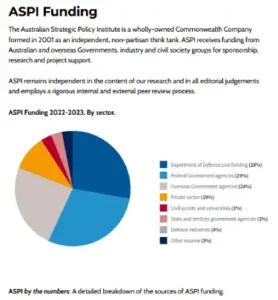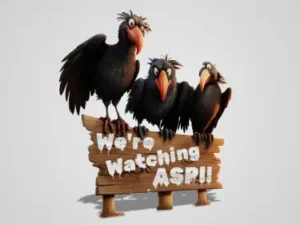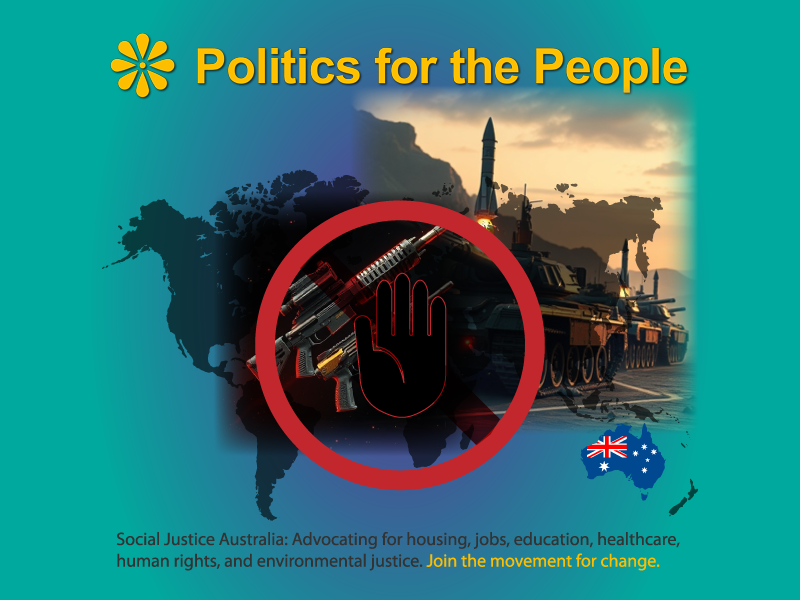Description
Dive deeper into ASPI funding and influence and its impact on Australia’s defence policies. Is it truly independent? #ASPI #DefenseTransparency
Introduction
The Australian Strategic Policy Institute (ASPI), a prominent think tank, significantly influences Australia’s defence and strategic policies. However, its substantial funding from the U.S. military-industrial complex raises critical questions about its impartiality. This comprehensive analysis examines ASPI’s financial backers, its strategic role, and the potential conflicts arising from its connections to the arms industry, shedding light on whether it can truly deliver unbiased policy recommendations.
Unveiling ASPI’s Funding Sources

ASPI’s financial support stems primarily from entities within the arms industry, notably those connected to the U.S. military-industrial complex. These entities, often critics of China, provide significant funding that could influence ASPI’s research outputs and policy recommendations.
Financial Ties with the Arms Industry
The financial connections between ASPI and the arms industry are complex and multifaceted. These industries, by funding ASPI, potentially secure a platform to advance policies favourable to their business interests. Such dynamics may lead to a biased narrative in ASPI’s research that supports increased defence spending and procurement policies that directly help their benefactors.
ASPI’s Strategic Influence on Defence Policies
ASPI’s role in shaping defence policy is substantial, with its recommendations often aligning closely with the strategic interests of its funders. This section explores how ASPI’s funding influences its public stances and policy advice, particularly concerning China and the broader Asia-Pacific region.
Impact on Policy Recommendations
The consistency of ASPI’s policy suggestions with the aims of its U.S. funders raises concerns about the objectivity of its advice. The think tank’s emphasis on the perceived threats from China and the advocacy for stronger military responses coincides with the interests of its defence industry sponsors, potentially skewing Australia’s defence strategies to be more confrontational than diplomatic.
Questioning ASPI’s Independence

ASPI promotes itself as an independent, non-partisan advisor to Australia’s defence leaders. However, the depth of its ties to the U.S. military-industrial complex and ASPI funding from arms manufacturers suggest that its independence might be compromised.
The Debate on True Independence
The critical examination of ASPI’s independence involves assessing the backgrounds of its key members, many of whom have direct ties to the U.S. military or defence industries. This overlap between personal connections and institutional funding challenges the credibility of ASPI’s claims to non-partisanship and raises questions about the impartiality of its strategic advice.
The Need for a Transparent Advisory Body
The transparency of advisory bodies like the Australian Strategic Policy Institute (ASPI) is paramount in ensuring that defence and strategic policies are developed in the best interest of the nation, free from undue influence. The existing concerns about ASPI’s connections with the U.S. military-industrial complex underscore the broader issue of transparency and independence within national policy-making frameworks. Here, we discuss why a transparent advisory body is essential and how it could be implemented.
Current Challenges in Transparency
The primary challenge in the current model, as illustrated by ASPI, is the opacity about funding sources and the affiliations of its members. Without a clear disclosure of these ties, there is a risk that the interests of powerful donors could sway policy advice rather than based on unbiased analysis. This lack of transparency can lead to policies that may help specific groups at the expense of national security and public welfare.
The Importance of Independent Oversight
An independent oversight mechanism is crucial for supporting the integrity of policy advisories. This involves not only regular audits of financial transactions and disclosures but also the vetting of personnel to prevent conflicts of interest. By ensuring that advisory members do not hold concurrent positions in industries related to their advice, a higher degree of objectivity can be kept.
Proposals for Enhanced Oversight and Transparency
To address these challenges, several steps should be considered:
1. Mandatory Disclosure of Funding and Interests: Implementing laws that require think tanks and advisory bodies to publicly show their funding sources and any potential conflicts of interest. This could include detailed reports on the financial contributions they receive and how these funds are used.
2. Establishment of an Independent Review Board: Creating an independent board tasked with reviewing the outputs of advisory bodies to ensure that they are free from bias and align with national interests. This board could include members from various sectors, including academia, non-governmental organizations, and the public sector, to provide a balanced perspective.
3. Public Participation in Policy Formation: Increasing public participation in the formulation of defence policies by holding public consultations and making draft policies available for public review before they are completed. This would not only enhance transparency but also improve public trust in defence advisories.
4. Regular Evaluation and Reporting: Instituting regular evaluations of advisory bodies to assess their compliance with transparency standards and the effectiveness of their advice. These evaluations should be made public to ensure accountability.
Benefits of a Transparent Advisory System
A transparent advisory system would have several benefits. It would reduce the potential for policies that are overly influenced by specific interest groups, thereby enhancing the legitimacy and credibility of policy decisions. Furthermore, it would promote broader public trust in defence and strategic policy-making processes, which is crucial for the democratic engagement and support of national security initiatives.
By addressing the need for transparency and implementing robust oversight mechanisms, Australia can ensure that its defence strategies and policies are crafted in the best interest of the country, free from external pressures or hidden agendas.
Proposals for Enhanced Oversight and Transparency
Advocating for stricter disclosure requirements of funding sources and affiliations within think tanks like ASPI is crucial. Additionally, setting up a new framework for an independent body that can offer strategic advice without any ties to the arms industry could help restore trust and ensure that corporate or foreign interests do not unduly influence defence policies.
Conclusion
The intricate relationship between ASPI and the U.S. military-industrial complex illustrates the potential for conflicts of interest in shaping Australia’s defence policies. For ASPI to truly serve the national interest, it must address these concerns through increased transparency and independence from its funders. Only then can it provide unbiased and genuinely beneficial strategic advice.
Call to Action
Demand transparency and independence in defence advisories! Share this article to promote awareness and advocate for unbiased policymaking in Australia. What steps will you take to ensure our national defence policies are free from undue influence?
Questions for Readers
- What is your view on the need for independence in think tanks advising on national defence?
- How can the public play a role in ensuring that defence policies are developed transparently?
The following five videos are worth wathcing:
- What are the threats China poses to the rest of the world?
- The threats China poses: Ep 2 Human Rights abuses
- The threats China poses: Ep 3 Hong Kong Democracy
- The threats China poses: Ep 4 Military Expansion
- The threats China poses: Ep 5 the Taiwan invasion
References:
Revealed: radical escalation in U.S. war machine funding for Australian Government “think tank” ASPI: https://michaelwest.com.au/revealed-radical-escalation-in-us-war-machine-funding-for-australian-government-think-tank-aspi/
The following links show that the “Fox” oversees advising on the security of the “Chicken House.”
ASPI is an independent, non-partisan think tank that produces expert and timely advice for Australia’s strategic and defence leaders: https://www.aspi.org.au/
The big squeeze: https://www.aspi.org.au/report/big-squeeze
The think tank behind Australia’s changing view of China: https://www.afr.com/policy/foreign-affairs/the-think-tank-behind-australia-s-changing-view-of-china-20200131-p53wgp
An informed and independent voice: ASPI, 2001-2021:https://www.aspi.org.au/report/informed-and-independent-voice-aspi-2001-2021

